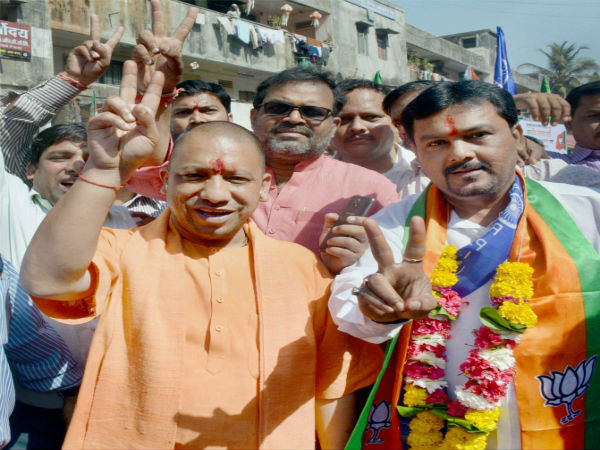
Is the apprehension in UP justified?
A former bureaucrat, however, said that the new regime could go for a review of several social welfare schemes to bring about a correction of whatever biases that existed in them.
Lucknow, March 19: The ascension of Adityanath as the new chief minister of Uttar Pradesh has caused an unprecedented and, hopefully, unwarranted apprehension among some sections of the people across the state. Not only those belonging to the minority community, but also those who have had a known anti-Bharatiya Janata Party stance in their lives so far, are a worried lot. The one common question they are asking each other is: what will happen in UP now?

Those watching political development in UP for decades, however, remember that while the question was expected, the fear is largely based on past experience. In June 1991, when Kalyan Singh had become the chief minister for the first time with a massive majority of 221 seats for the BJP, there was widespread apprehension among various sections of the people as to what Kalyan Singh would do in the Ayodhya Ram temple issue. That he went on to oversee the demolition of the shrine in Ayodhya on December 6, 1992 and resigned the very same day, confirmed the worst fears of his detractors.
However, the apprehension on Mayawati taking up the top job for the first time in 1995 as the head of a coalition government or later as a sole leader of the Bahujan Samaj Party, was of a different kind -- that a particular group of communities might dominate the socio-political landscape. A similar apprehension of dominance of a particular caste group was very much visible when Mulayam Singh Yadav became the chief minister either as head of a collation government or on his own strength as a Samajwadi Party leader.
This time the fear is more palpable and is being expressed quite vocally on social media and elsewhere. Even young people who are working professionals or students, besides elders who are politically committed, have come out openly with the question about their future in the state.
Strangely, many eminent citizens of Lucknow, too, have expressed similar fears even though in the past they had never faced any discrimination from governments of different political parties. Organisers of cultural festivals, literary festivals, music programmes, protest candle marches etc appear to be especially uneasy.
A look at the history of communal conflicts in the state indicates that since the 1990s indicates that such conflicts are not confined to the regime of any one particular political party. In fact, the just-concluded tenure of the Samajwadi Party saw an alarming number of communal conflicts right from Muzaffarnagar to Bareilly, Saharanpur, Tanda, Pratapgarh and other places. The close connection that has existed between Hindu and Muslim communities in the state for centuries does not appear so weak as to wither in a regime headed by a hardliner.
A former bureaucrat, however, said that the new regime could go for a review of several social welfare schemes to bring about a correction of whatever biases that existed in them. Such correction, according to him, may not make a big difference in the overall implementation of the schemes, but could silence those who had been clamouring for a change in the so-called appeasement policy.
Another correction could take place in the deployments in police stations across the state from where complaints of caste discrimination had been coming in. "A large-scale reshuffle across all levels of the police could be among the first things to happen," he said.
"Uttar Pradesh is a large and sensitive state, and both Prime Minister Narendra Modi and the BJP would not like the situation to turn hostile in this state prior to the 2019 Lok Sabha election," he said.
On the other hand, spontaneous celebrations by sections of people, raising of provocative slogans, attempts to mock or taunt people of the minority community, objectionable comments or speeches etc are also not ruled out, at least for the first few days of the new team taking over. It will be a challenge to contain such occurrences and maintain peace for Adityanath and his deputies Keshav Prasad Maurya and Dinesh Sharma.
In the middle of all kinds of reactions, there are some people who think that the big responsibility will lead to a change in the approach of the new chief minister. He enjoys a clean reputation and is known to be strict against corruption. He is also not confined to any particular caste group. Contrary to the hardliner image of the Yogi from Gorakhpur, Maurya and Sharma are known to be friendly and soft-spoken. It is likely that the decision to appoint two deputies is meant to bring about a moderation in the government's approach. A new system of collective decision-making could emerge from this experiment.
From terming the decision to 'a big assault of secularism' to 'systematic playing of communal card', opposition parties like the Congress, Left parties, SP and even Trinamool Congress, are already in a confrontationist mode even before Adityanath sits on the chief minister's chair. But, the reaction of Samajwadi Party leader Naresh Agrawal appears to reflect what the people of UP are thinking, "We will wait and watch for six months. We hope he will change his thinking and desist from creating a divide between Hindus and Muslims."
OneIndia News


 Click it and Unblock the Notifications
Click it and Unblock the Notifications


































